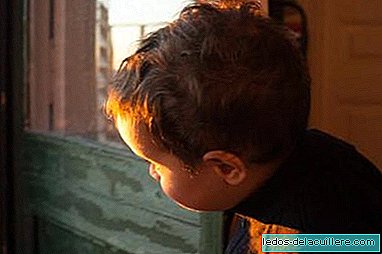
I must start by saying that I do not like the term prolonged breastfeeding at all, since its meaning is as variable as the mentality of people. When a mother breastfeeds beyond nine months or the year, many uncomfortable situations, criticisms and comments born of ignorance from her surroundings continue to be encountered. This is undoubtedly the worst of difficulties and problems of prolonged breastfeeding.
It is usually considered prolonged breastfeeding the one that goes beyond the two years that the World Health Organization advises as the minimum optimal breastfeeding time, however, the same WHO clarifies that it is a figure that only indicates the minimum and that there is no reason to wean the two years.
That said, in reality a breastfeeding would last as long as mother and child decide, and it could be normal to maintain it until, perfectly, the six or seven years, without there being any real data that demonstrates that this is harmful, as we will see later, and, not only that, but it is a normal weaning age according to ethological parameters referred to the characteristics of our species, as recognized by the Lactation Committee of the Spanish Association of Pediatrics.
Breastfeeding after two years is usually much simpler. The initial problems were overcome, the children have more stable sleep patterns and breastfeeding serves as comfort and reconciliation as well as food. We will no longer worry if you drink enough, as we will give all kinds of food and also, if we want, other dairy products. Even if there are situations in which we do not want to breastfeed or do it privately, children understand and can accept these conditions.
But, on the other hand, it still has in its favor the same advantages as before: a high quality food always ready and protective, sterile, which can rehydrate, feed and comfort at the same time.
Difficulties for a mother who wants to breastfeed More than two years are, fundamentally, the pressures and misunderstanding of the environment.
Data against prolonged breastfeeding
There is really no data to show that breastfeeding for more than two years has the slightest inconvenience to the health or emotional development of the child. Nor for the mother. Rather, all published studies usually indicate that the benefits of breastfeeding are maintained over time and are even greater the longer the breastfeeding lasts, although there are usually few specific studies on older children.
And rather there are very clear data that indicate that, despite being a very influenced issue by variable cultural patterns, the period of natural breastfeeding in humans can be set between two and a half years and seven years, according to the Marker analyzed. Therefore, talking about prolonged breastfeeding does not make much sense.
It is often indicated that children need to drink milk to achieve a complete development of their bones and their growth, at least until six or seven years. If the human child really needs to drink milk, logic tells us that we would always speak originally of milk of its kind rather than milk of another, even if they can assimilate it.
However, since in our environment breastfeeding two years is a minority and attacks on breastfeeding mothers begin much earlier, towards the year, I will refer to the prolonged breastfeeding and its problems in a flexible way and depending a lot on the environment and its assessment of breastfeeding after the introduction of complementary feeding.
In spite of provide multiple benefits and no inconvenience is known for prolonged breastfeeding, women who decide to breastfeed their babies today for a period longer than two years, often encounter difficulties.
Although there are campaigns and a greater awareness of the benefits of breastfeeding, they are still presented as if it were something added, a plus that we can offer to our children, producing the situation in which the breastfeeding mother does not receive enough information or support from the environment.
The loss of breastfeeding culture
Our society has lost in the last hundred years the culture of breastfeeding and it is still considered "normal" to breastfeed for a few months, but when the year is over, moms begin to feel a strong pressure from acquaintances, relatives and even from the lady of the super's tail who are allowed to indicate the damage that does to his son, the psychological problems that await him and that his milk, of course, can no longer feed.
False myths, incompatibilities, problems for the mother and mental disorders prophesied for the child have already given many issues to Babies and more. The information creeps slowly and many nonsense are still heard against breastfeeding on demand, night breastfeeding, exclusive breastfeeding, all of them guilty, in the end, of failures in desired breastfeeding lost by bad advice.
If we add that sometimes mothers do not have someone with experience who knows how to identify the problem and help them effectively, it is difficult to get ahead.
Health professionals and prolonged breastfeeding
Unfortunately Sometimes health professionals do not support breastfeeding as they should. I remember my first pediatrician, the one who gave me canister milk to give to my son when I went to work and told me that getting the milk was an absurd whim, the one that scheduled the night weaning with Estivill from the age of six months and since then he considered to continue with his chest after the year a senseless mania. Come on, an advocate of breastfeeding that undoubtedly achieved that few children could continue to drink breast milk after going through their consultation several times.
I am afraid that she is not the only one who keeps sending unnecessary help bottles, sends artificial milk for the porridge, tells you that the milk is for dessert once you have introduced the complementary feeding prematurely and considers that breastfeeding is harmful at night. Every time they are less, but they remain and you have to know how to detect them to run away from them if you want to breastfeed without problems.
Of course there are great pediatricians and nurses who are updated, as is their obligation and help mothers to continue breastfeeding, giving them all the necessary information so that they understand how important breast milk is for their children also after six months or a year. Without them, Spanish breastfeeding rates may never be improved. You have to recognize the great role they do.
However, despite the great influence that our pediatrician or our midwife or pediatric nurse can have on the failure or success of our breastfeeding, the pressure on mothers who are already informed and have decided to continue breastfeeding while their children they wish, not usually come so much from the toilets, which have been learned to sort or choose, but from the environment: family, friends, neighbors, co-workers or, in general, anyone who finds out that you have not weaned before year and is considered entitled to give you the talk. The difficulties of breastfeeding prolonged are social as I said at the beginning and we will see in the next topic how to deal with them.












